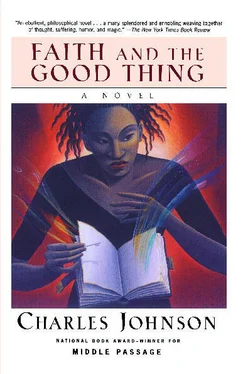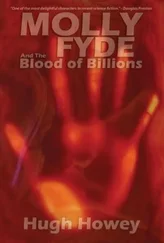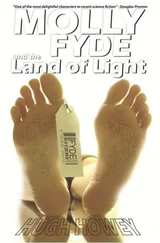The bossman produced his whip, raised it, then looked curiously at Jones. He dropped the whip and pried open Jones’s mouth to look inside. “You got blue gums,” he muttered to himself. “Hit is possible. Blue-gum nigguhs can do ’bout anything when it comes to magic.” Then his tiny blue eyes flashed. “You gotta prove hit to me. Tonight. And if you don’t, I’ll string you up to feed the crows.”
That night, in the worker’s shed, everyone prayed for Jones. They knew he was lying. It occurred to Jones that he was going to die. There’d be more vultures around him than women; they’d pick him dry. The bossman, certain all his workers were locked in the shed, went out and shot a coon, brought it back, and stuffed it into an old burlap sack. He entered the shed, the workers drawing back into the shadows; he dropped the bag at Jones’s feet and grinned.
“If you can tell me what’s in that bag, you and me gonna make a lot of money.” He rubbed his palms together. “Go ’head, we gonna be rich—”
Jones circled around the bag slowly, then reached out to touch it.
“Hands off, Mr. E.S.P.,” the bossman shouted. “You just tell me what’s inside.” He produced his whip and let it swing loose at his side. “You’d better not be lyin’, Jones! If you’re lyin’, I’ll see you swing!”
You would have thought Jones had been walking in the rain, so wet was his clothing. He stared at the bag this way and that, looked at it sideways, and every whichaway, until his eyes hurt. He couldn’t figure it out. Cotton? Shoes? Corn? Finally, he gave up and hung his head.
“Hit looks,” he said, “like you got this heah coon. ”
“What?” the bossman cried. His eyes strained at Jones. “Tha’s hit, tha’s hit!”
Jones looked inside the bag. He felt light as a feather, and turned to point his finger at the boss. “Yep, and I can tell the future, too. I can tell that in ten seconds your heart’s gonna give out like a cheap watch. Believe hit! Hit’s gonna draw into itself real tight like a spring, and BURST!” Jones glanced at the clock on the wall of the shed and counted, “One, two. ” and by the time he got to ten the bossman was stone-cold dead.
Faith was silent for a second. She ran her tongue along the inside of her mouth, then stared at the unfinished portrait on his easel. “But what about the Good Thing? You didn’t tell me what it was—”
Jones laughed. It sounded like barking. “You were good.” He looked down at the tablecloth and their empty plates. “That story was good. The dinner was good. ”
Somehow it made sense. Faith went again to the Swamp Woman’s portrait. She could almost hear it sniggering. The good things were the things of the moment, the things that had been felt and tasted and touched in the past, and might be tasted still. Kujichagulia should have stayed in the village of mountain vales. He should have loved and worked and lived to feel the Good Thing in its small reflections. He might have lived longer that way.
Jones stood up and threw out his arms. Stretched. She watched his easy progress to the portrait of the Swamp Woman. He took his palette from the floor, studied it, and, as he said something to her she would never recall, began squeezing paint from twisted half-empty tubes of alizarin crimson and thalo green. What she felt about Alpha,
It was difficult to say, but she’d sensed something different about him as they made love, his weight smothering her comfortably like the curtain of evening on a weary farmer after a hard day in the fields. Unlike Maxwell and the Alpha of her youth, he had not asked if it was good: he’d changed. She could smell that change in his odor, no longer that of barley and cotton and Hatten County, but of turpentine and paint. Jones walking through the dry weeds on the land behind his father’s farm was not what she saw: but Jones, his broad shoulders framed by the square canvas and his movements strangely ritualistic, merged, so to speak, with the canvas itself; Jones to her seemed no longer a boy. But not a man either. An eternal child, perhaps. Yes. It came through now as clear as the lines in a wet leaf: when he created, he tried to create himself anew. She counted off long minutes while he spent preparing his tools — rusty palette knives, old brushes with cracked stems, waste rags, and a wide range of pigments, cleaning them with all the care a paraplegic might take to clean his added appendages. Thirty minutes. Then he began: the unfinished corners of the Swamp Woman’s face were conjured beneath his brush, as were shadows and illusions of light, depth, and space in images as clear as those she’d seen on the blank pages of Barrett’s Doomsday Book. Every inch of the lush, rolling background, every curve of the hills and angle of the farmhouse, every line of the fields crisscrossed with primitive industry was incredibly precise. But unreal. Jones had no truck with describing the scene. He was, she realized, calling these things, changing, twisting, and transforming them into — what? Order. The scene puzzled her because there could be no doubt that Jones, though he had no reason to be happy in his present situation, was, when he painted, freer, happier, and more whole than anyone she’d seen since she arrived in Chicago.
She was slightly touched, slightly saddened by the truth of it all. There was Jones and his canvas, his object, but through his object, not in spite of it, he seemed to find release: the Good Thing. She envied him, then felt terrible, for since she could not create, how then could she realize her goal?
Almost in spite, she said, “That doesn’t look like her at all. ”
Jones looked over his shoulder, his grin more peevish than warm. “I gave up realism a long time ago — there’s enough of that in movies.” Seeing her jealousy, he smiled. “I started paintin’ in prison. Durin’ the day hit was the only time I was in control of my life. In the mornin’s they led me to the machine shop; in the afternoons I sweated through exercises in the yard, but at night — when I was just a little tired and, therefore, alert — before they’d turn out the lights, I could paint.” Jones’s eyes gleamed. “Hit was the only time in my whole life that I had something to say about what went into, or was taken out of, my world. ”
Completing a black boil on the Swamp Woman’s nose, he dried his brush, then stood back to admire his work. “Hit made bein’ in jail bearable,” he said. “And when your husband convinced them to set me free, hit made bein’ back in the world bearable, too. Hit ain’t easy to explain — I tried to study up on hit to make hit clearer to me, but hit’s still fuzzy.” For a moment, he stroked his jaw and pulled at the wings of his nose; then he gestured at the canvas. “I ain’t even certain what this thing is ! A fellah in the joint told me hit was all a trick, that your eyes are fooled by the points and planes and lines. One guy told me hit was supposed to show life as hit is, another said hit wasn’t no good unless hit made him forget alla his problems.” Jones frowned, bending toward the canvas, pointing at it. “A teacher in the joint said what I painted wasn’t as important as how I did hit. A Muslim said my work was worthless unless hit was instrumental to his cause, and another guy — a damned fool! — said all that mattered was my puttin’ alla my feelings in hit, like kids do, and forgettin’ form.” Jones slammed his left fist into his right hand; he glared at the painting, then at Faith. “All I know is that doin’ hit makes me feel good, the way goin’ to Sunday meeting with Reverend Brown never could. In fact, if I paint on Sunday I don’t even feel like I need to go to church!”
Now she knew she didn’t know him. Yet what he said was familiar. She remembered the feeling of sanctity she’d felt when sitting under a tree, catching its hard sap in her hands on the Sundays she’d not gone to church but had felt — though she was miles from Reverend Brown’s moaning bench — wedded with the warmth of the earth and the wind. Art, perhaps, was not confined to a canvas. Not at all.
Читать дальше












